Thu 9 Jun 2022
A Movie Review by David Vineyard: TWO MERRY ADVENTURERS (1937).
Posted by Steve under Mystery movies , Reviews[5] Comments
TWO MERRY ADVENTURERS. Germany, 1937. Also released as The Man Who Was Sherlock Holmes; original German title Der Mann, der Sherlock Holmes war. Hans Albers, Heinz Rühmann, Hilde Weisner. Screenplay by R. A. Stemmle and Karl Hartl (the latter also director). Currently available on YouTube.
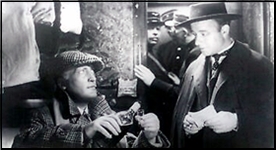
An official entry in the Venice Film Festival, Two Merry Adventurers is a curiosity all around. It’s set in a never never land where everyone in contemporary Europe believes Sherlock Holmes to be real and Sir Arthur Conan Doyle is still alive eight years after his death.
The other curiosity is that this good-natured comedy mystery with musical interlude was made in Nazi Germany well after they had taken over all aspects of the German film industry. There is no sign of that in this film, not even subtly. It might as easily have come out of Hollywood or the United Kingdom in the same period, fast paced, funny, and light of step.
Hans Albers, who would still be going strong twenty years later in German film, may seem an unlikely choice to play any variation of Sherlock Holmes. Blond, pale eyed, stocky, and ruddy cheeked, it’s quite a stretch to imagine anyone could see him as the image of Sherlock Holmes, but the titles to the film show countless covers to the German pulp editions of Holmes adventures that do show Holmes vaguely resembling Albers’ interpretation.
Not that any of that matters. Albers was a natural on screen much closer to his American and British counterparts than most of his European contemporaries. His best film would probably be the 1943 fantasy The Adventures of Baron Münchausen, also an unusual film to have come out of Nazi Germany, certainly in wartime since it is not only a comedic fantasy but vaguely anti-war (while I can’t speak for this film, the cast and crew of Münchausen were apparently hiding several Jewish production members while making the film).
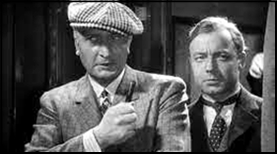
Albers is Morris Flint, who with his companion Macky Macpherson (Heinz Rühmann, who would become the popular West German Maigret in the late Fifties and Sixties) has dressed as Sherlock Holmes and Dr. Watson (save only in German pulps did Holmes every wear a flat cap and checkered coat) stop a train on the way to Brussels.
Though denying they are Holmes and Watson they act very mysterious and everyone jumps to the conclusion that they can’t be anyone else. What they are really after is a free ride and maybe a compartment, if they can scare any crooks on board by their appearance. Sure enough a pair of bank robbers jump train at the sight of them.
In the compartment next to the crooks are a pair of young English women the crooks have tried to compromise. The girls are on their way to visit the estate of their late uncle near Brussels and collect on their inheritance, but for the time being that takes a back seat to Morris and Macky finagling a nice hotel room in the best hotel in Brussels and discovering among the criminals luggage a fortune in what they assume is stolen money.
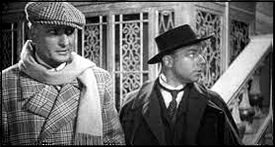
Having foiled bank robbers, the two are approached by the police to deal with a desperate case involving priceless missing stamps — that belonged to the two English women’s uncle.
The boys are more than happy to help the two attractive women, only to discover their Uncle, far from wealthy, was hiding a massive international counterfeiting operations of not only money but collectible stamps.
But there are also the real stamps used to copy the counterfeits from, and soon Morris and Macky find themselves surrounded in the criminals lair hoping the police arrive in time to save their necks.
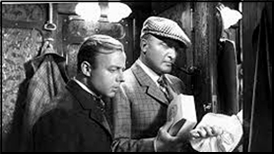
In capturing the gang though, they have exposed themselves and are put on trial by a tribunal for fraud, where Morris almost talks their way out of prosecution, but when things start to look bad Conan Doyle himself shows up and asks the court to spare the two who were just trying to start their own private detective business and never actually claimed to be Holmes and Watson.
All Doyle wants for his efforts is to write their story, “The Man Who Was Sherlock Holmes.â€
It’s a surprisingly bright and brittle mystery comedy that moves at a rapid pace and turns on the charming lead performances by Albers and Rühmann, who went on to long careers in film as did screenwriter Stemmle and director Hartl.
Accept it as pure cinema and it is an entertaining romp handsome to look at and harmless fun to watch. It makes for an oddity in the history of Sherlock Holmes films, but one well worth catching.
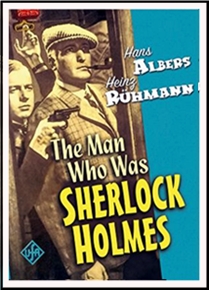
June 10th, 2022 at 7:45 pm
I have found an Internet Archives video that is supposed to have embedded English subtitles, but if it does, I have not yet been able to access them
https://archive.org/details/der-mann-der-sherlock-holmes-war-1937
June 10th, 2022 at 9:34 pm
Steve: re: the archive closed captioning: there’s a cc button at the bottom of the screen. You have to click it and turn it on.
June 10th, 2022 at 10:06 pm
None that I can see, and I’ve been looking.
June 10th, 2022 at 10:34 pm
The one with imbedded subtitles is by “Old Movies in B/W with Subtitles Simonbartbull” so if you check his site and playlist you should find it. He has posted several German films including many Edgar and Bryan Edgar Wallace films and many more mostly Krimi including some better films like this one and some of the others I’ve reviewed recently, all with English subtitles.
There are some interesting films on there including German adaptations of James Hadley Chase, Victor Gunn, and Francis Durbridge works. The films range from good junk to critically acclaimed ones.
June 10th, 2022 at 10:57 pm
Aha! Thanks, David. Here’s the link:
https://www.youtube.com/watch?v=OiVz990y2uY